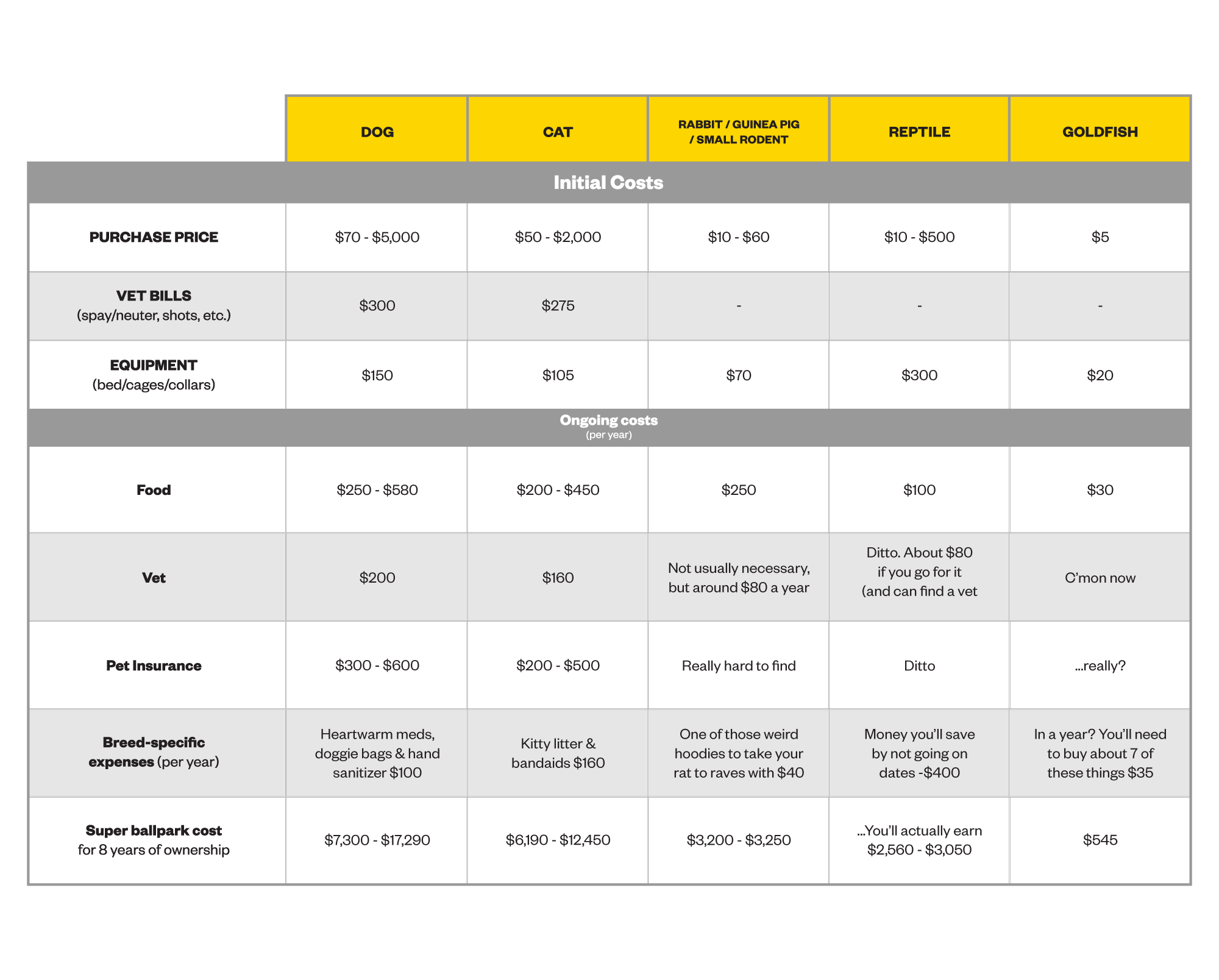Presented by
When it comes down to it, all that we really want is someone to cuddle with while we watchRiverdale or drink radlers in the park.
Videos by VICE
But Tinder is soul-crushing, eHarmony is solely for office administrators in sports jerseys and chinos/yoga pants, and agreeing to blind dates means accepting that your friends actually think you could hit it off with a self-proclaimed “memelord.”
There are two facts to keep in mind: 1) dating is horrible 2) pets are awesome. And pets can fulfill all the emotional needs that your ex-boyfriend with the boat shoes never could. Plus, Golden Retrievers are way better at snuggling.
Owning a pet is a huge responsibility though, and it can also be a pretty big financial hit. So before you completely fall in love with that one-eyed Corgi from the SPCA Facebook page, let’s take a look at what responsible pet ownership really costs.
Bringing home your new best bud
When Lucy Waters, a 26-year-old grad student, decided to get a cat, she knew exactly how she’d go about it. “It was really important to me to go to the Humane Society instead of some massive pet store where they prioritize profits over their animal’s well-being.” There she found Tabitha, an American Shorthair who was hers to keep after a short interview and a $60 charge.
If straight-up altruism isn’t enough to sway you, adopting a pet from a shelter rarely costs more than $150, and you’re just covering their admin and vet expenses. Plus, pets will usually come already spayed or neutered (saving you at least an extra $70).
If you’re desperate for a brand new ball of fluff, there are other options for both the type of pet and where to get it—though some are more contentious than others. Puppies/kittens from a legit breeder will usually run you between $200 and $3,000 depending on the breed. Other (legal in Canada) animals range anywhere from $30 for a guinea pig to $12,000 for a Hyacinth Macaw.
Keeping it alive
When you’re choosing a pet, it’s important to calculate all the expenses that’ll add up over the years. Food, equipment, vet bills, and other ongoing costs can easily top $1,000 a year for your average doggo — and that’s assuming it’s in good health.
You’ll also need to budget your time, which could be hard depending on your job and lifestyle. Dogs and cats might live up to 12 years, but cockatoos can stick around for over 30. You’ll have to plan for your circumstances changing.
“I got Mungo when I was bartending and freelancing,” explains David Rubin, owner of said English Bulldog. “I could take him out every afternoon before I went to my night job. But when he was four, I started a regular 9-5. I had to scramble to find a dog walker, which cost $20 a day until I found someone cheaper.”
If you’re not flush with friends to look after your ‘lil guy, set aside some money for pet sitting or kenneling (which averages around $25-45 a day).
Planning for the inevitable surprise
Little Roscoe might be fine for your budget when he’s a healthy puppy, but one day he could need a hip replacement. Pet insurance is a great way to prepare for these costs if you buy it early, since few plans will cover pre-existing conditions. In Canada, the average insurance premium is around $40 a month for a dog and $30 for a cat.
Your pet’s premiums and coverage will depend on its age, breed, species, and surprisingly, your location — something that also might affect your vet bills.
Kiran Sandhu is a 29 year-old photographer and mom to Winnie, a Cocker Spaniel. When Winnie had several abscessed teeth, Kiran was shocked by how expensive the bills that Toronto vets were quoting her. Instead she headed to her parent’s place up north, where their vet did the procedure for half the covst. “If it’s not an emergency, definitely leave the city,” says Sandhu. “It’s way more affordable at the country vets.” Dental care is a huge issue as pets get older, so you may want to do some research in advance to find a reliable (and affordable) vet in your surrounding area.
Broke, but still need some companionship? Let’s break it down:

So what did we learn?
Like any new addition to your family, getting a pet is going to take some careful planning. Set a budget, and then add an extra 20% on top to cover any sudden surprises — like if ‘lil Pantera gets cat diabetes or Bob Barker starts picking fights with coyotes.
If this all sounds too steep why not ride the 90s nostalgia wave with a Tamagotchi?
More
From VICE
-

Illustration by Reesa. -

Screenshot: GoldFire Studios/Ocean Drive Studio, Inc. -

(Photo via Lorado / Getty Images) -

Getty Images
